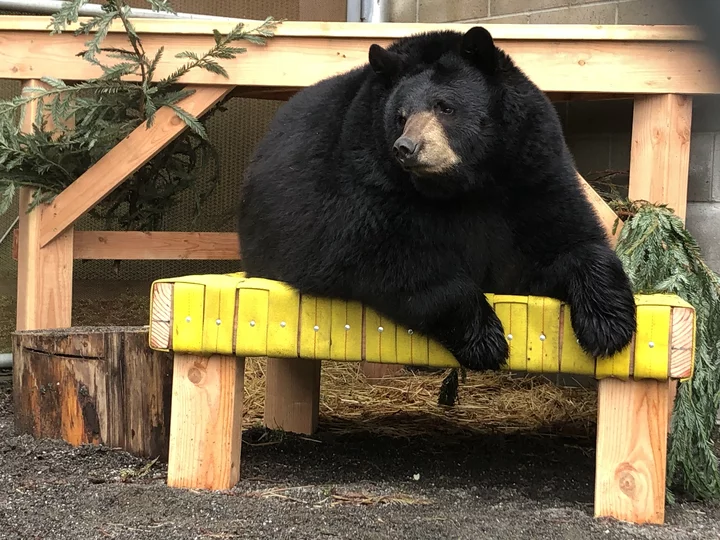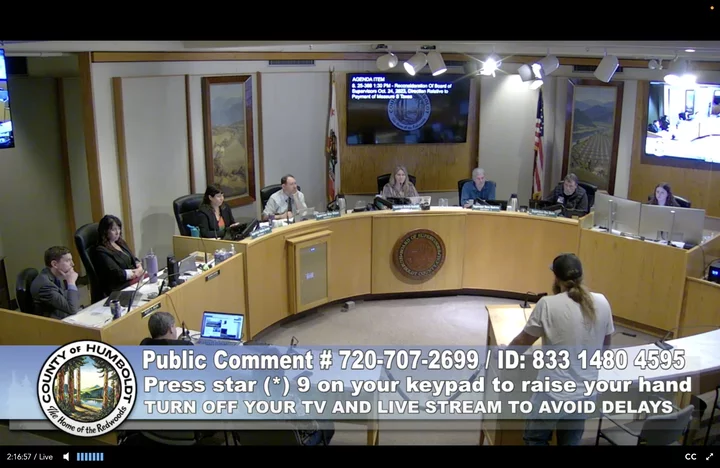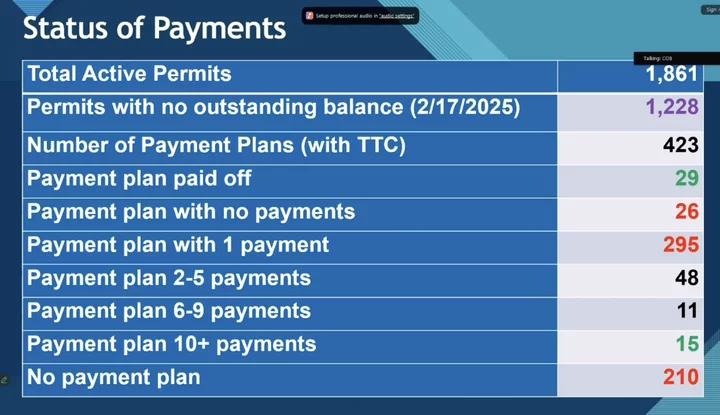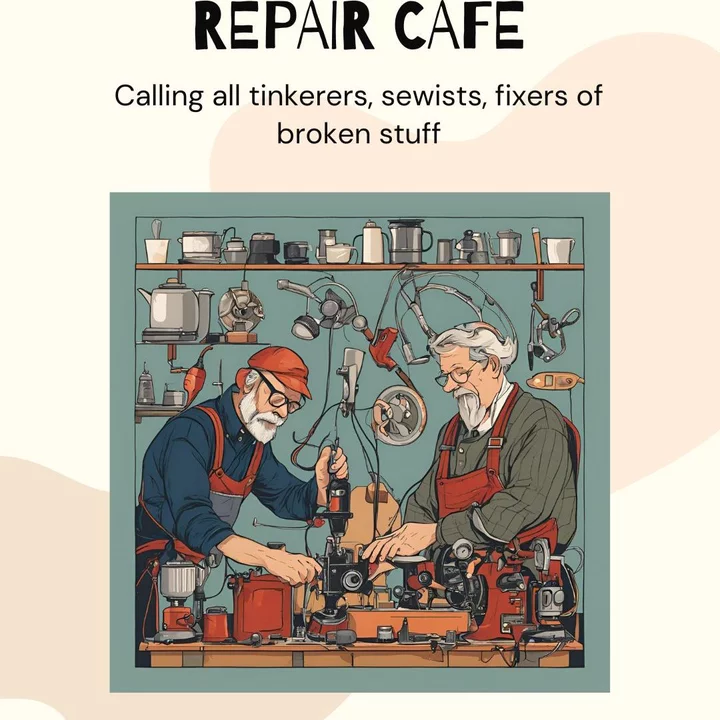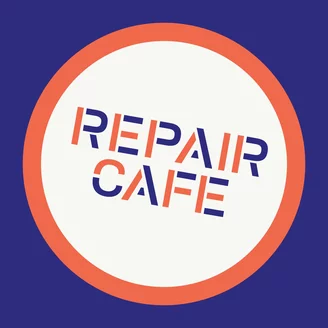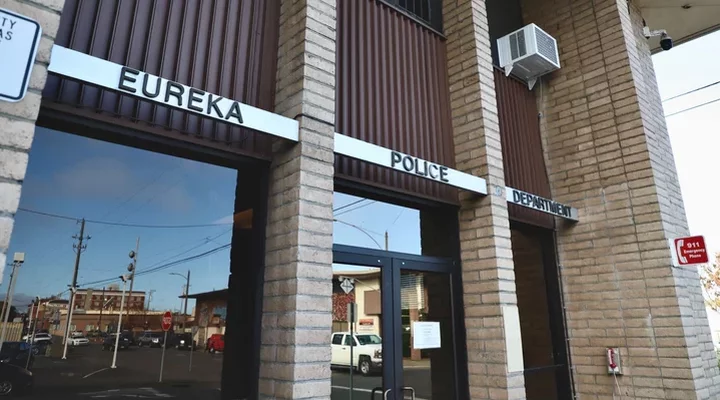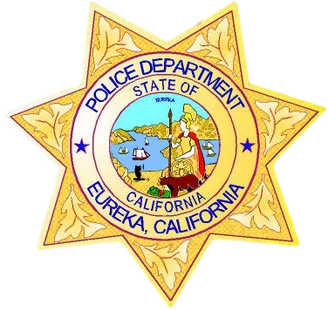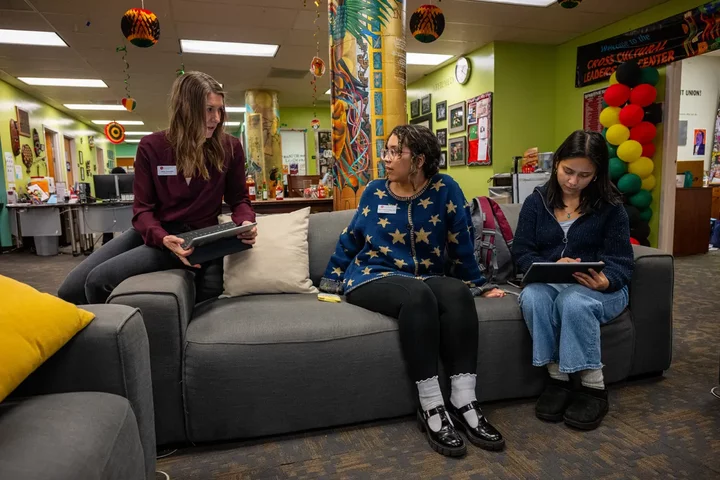NEW BEAR ALERT! Sequoia Park Zoo Has a New Fuzzy Wuzzy for You to Go Gaga For
LoCO Staff / Wednesday, March 26, 2025 @ 3:02 p.m. / Cavy Babies
Say hello to your new bear friend, Ishŭng! | Photo: Sequoia Park Zoo
###
Press release from Sequoia Park Zoo:
EUREKA, CA – Early last week, Sequoia Park Zoo quietly welcomed a new American black bear (Ursus americanus) to the Zoo. Placed at Sequoia Park Zoo by California Department of Fish and Wildlife (CDFW), this adult female will undergo a typical month-long quarantine period before gradually being introduced to the rest of the habitat and the Zoo’s male black bear.
“We are excited to bring another bear to our Zoo family,” says Amanda Auston, Animal Curator. “As with all new animals, we will work hard to ensure a smooth transition for her - and our boy Tule, of course!”
American black bear, Tule, has been thriving at Sequoia Park Zoo since May 2023, when CDFW placed him at Sequoia Park Zoo after determining that he was unsuitable for release to the wild. Every year, state and federal agencies must find placement for a small population of animals, and organizations like the Sequoia Park Zoo play an important role in providing permanent homes and care for these animal ambassadors while educating the public about wildlife and the environment.
The Bear and Coyote habitat at Sequoia Park Zoo opened in 2023 with generous funding from the Bear River Band of the Rohnerville Rancheria, and we continue to be deeply grateful for their partnership and support. Bear River has chosen the name “Ishŭng” (pronounced “Ee-shung”) for the newest resident of the habitat.
“The word is the action of one eating,” explains Josefina Frank, Bear River Band of the Rohnerville Rancheria Council Chairwoman. “In this case, and with the name ‘Ishŭng,’ it means ‘she likes to eat.’”
Ishŭng came to the Zoo at a weight atypical for a bear of her frame, sex, and species, and animal care staff are developing a nutrition and activity plan that will help her reach a healthy weight and body condition.
“She’s a beautiful bear,” reports Jim Campbell-Spickler, Zoo Director. “And seems very sweet. We are happy to be on this journey with her and thankful to California Department of Fish and Wildlife for placing her with us.”
Sequoia Park Zoo has been proudly accredited by the Association of Zoos & Aquariums (AZA) for over 25 years and is committed to the highest standards of animal wellbeing, conservation, and education. The Zoo currently cares for over 150 individual animals representing more than 50 diverse species, including non-releasable native wildlife like eagles, bears, and owls. We care for these animal ambassadors while encouraging guests to responsibly live alongside wildlife and the environment.
Animal care staff will monitor the health and comfort of Ishŭng while she becomes acclimated to life at the Zoo, and we look forward to providing updates as we get to learn more about her personality and preferences. Observant visitors may be able to catch a glimpse of her during quarantine, and we ask guests to make her feel safe and comfortable by remaining quiet and calm around the habitat.
BOOKED
Today: 7 felonies, 7 misdemeanors, 0 infractions
JUDGED
Humboldt County Superior Court Calendar: Today
CHP REPORTS
No current incidents
ELSEWHERE
County of Humboldt Meetings: Audit Committee Agenda - Regular Meeting
The Atlantic: How America Got So Sick
The Atlantic: America Isn’t Ready for What AI Will Do to Jobs
NY Times : Can Mountain Lions Survive as Humans Close In? California Is Trying to Find a Way.
YESTERDAY in SUPES: Board Grants Tax-Delinquent Weed Growers Another Reprieve, Receives a Decent Audit Report and Considers Organizational Shakeup
Ryan Burns / Wednesday, March 26, 2025 @ 1:52 p.m. / Cannabis , Local Government
A cannabis farmer addresses the board at Tuesday’s meeting. | Screenshot.
###
The Humboldt County Board of Supervisors on Tuesday provided a bit more breathing room to local cannabis cultivators who might otherwise be down to their last gasps.
Growers who are delinquent on their Measure S cultivation taxes had been given a deadline of March 31 to square up their bills or face permit revocation. After that deadline was established, nearly a year and a half ago, more than 400 permit holders entered a payment plan with the county, while a couple hundred others failed to do so.
Early in the hearing, Planning and Building Director John Ford ran down the numbers: Out of 1,861 current permit holders, nearly two thirds (1,228) have paid all of their Measure S taxes. Another 423 have entered payment plans and made some or all of their payments. The remaining 210 permit-holders owe taxes and have yet to enter a payment plan with the county. Their permits have been suspended, though not yet revoked.
Graphic from county staff showing the payment status of permitted cannabis farmers in Humboldt County. | Screenshot.
###
If the board had stuck to its guns, it could have sent all 600-plus delinquent growers into the suspension and revocation process. But as they’ve done several times before, the supervisors bestowed mercy on the county’s struggling weed farmers.
At the end of a public hearing that included emotional testimony from the public and from Second District Supervisor Michelle Bushnell, the board voted 4-1 to give the 210 most delinquent growers just a few extra days — until next Friday, April 4 — to make at least one payment and enter a payment plan.
The board offered a lengthier extension to the rest of the tax-delinquent growers, giving them until the end of this year to pay all Measure S taxes due in order to avoid suspension and possible revocation.
During the public comment period, more than two dozen growers and their advocates urged the board to show leniency once again.
“Think about the jobs that will be lost if you decide to revoke or suspend,” said Thomas Mulder, a licensed farmer and Bushnell’s appointee on the Humboldt County Planning Commission.
A grower who spoke by phone without offering his name said he’s made 11 Measure S tax payments despite some major business setbacks.
“In 2021 I had some sales lined up,” he said. “We sold the product to a licensed distributor who basically never paid us. It was a pretty heavy hit.”
Galen Doherty, owner of Whitethorn Family Farm, said the wholesale cannabis market is “worse than it has ever been,” and he described Measure S as an “onerous burden” on small, independent cannabis businesses. He urged the board to extend its payment deadline.
“Forcing farmers to pay these outstanding balances in full at the beginning of spring, when all of the startup costs for the year are coming in, is directly taking food off our tables and money out of our pockets when we need it most,” Doherty said.
Farmer Craig Nejedly asked for the deadline to be extended by another year, saying, “I feel like I’m being penalized for going all in on legal cannabis.”
Huckleberry Hill Farms owner Johnny Casali said that while he doesn’t personally owe any Measure S taxes, and while there are “quite a few farmers that don’t ever intend to give you a dime,” he believes the small farms of Humboldt County are worth preserving if at all possible.
Natalynne DeLapp, executive director of the Humboldt County Growers Alliance, urged the board to look at the faces of the people who’d shown up to the meeting. “These people are real people,” she said, “and they have given everything. And they’re asking for a chance.”
The normally stoic Ford agreed with this sentiment, saying that’s what makes enforcement actions so difficult.
“Some of the people who are represented here, you know, you work with them over time, you fall in love with them,” Ford said. He added that the board may soon want to consider some policy changes, perhaps making it easier for locals to get a micro-business license allowing them more flexibility in growing, packaging, distributing and other facets of the business.
The board then set about debating how to proceed, with Bushnell asking her colleagues to consider the 210 most delinquent permit-holders first. The board was in general agreement that this group had gotten enough leeway.
Bushnell said this situation is heartbreaking for her personally. She watched the heavily cannabis-dependent Southern Humboldt community go from thriving to “nothing.”
“I’m born and raised there and have seen lots of transitions down in Southern Humboldt,” she said, citing the prior boom-bust cycles of cattle, timber and fishing. “But this transition, how devastated the community is, I’ve never seen.” Later, Bushnell mentioned that her own Garberville clothing and shoe store, Boot Leg, is failing and she needs to close it.
She also said it’s about more than just a job for the people involved in the industry. “Farming for a lot of folks is their dream,” Bushnell said. “It’s their lifelong dream, and they, they — it’s who they are.”
Madrone, meanwhile, said he and many of his constituents are concerned about fairness, considering the 1,200-plus growers who’ve paid all that they owe.
“So if we give all kinds of extensions to people who either haven’t done anything or made one payment or whatever, where’s the fairness in that?” he pondered. He later said he’s in favor of offering extensions but wanted them to be “measured.”
Fourth District Supervisor Natalie Arroyo said she feels deeply for those who are struggling as well as those who’ve paid all of their Measure S taxes. “So we’re between a rock and a hard place,” she said. Arroyo tossed out another proposal entirely — one involving multiple deadlines and percentages — but the notion failed to gain traction.
Bushnell wound up making a motion to set a new deadline of Dec. 31 for all delinquent growers except the 210 who’ve yet to enter a payment plan. Those folks have until next Thursday to come in and make at least one payment in any amount. The others who owe Measure S taxes must pay their full bills by the end of the year to avoid suspension and possible revocation.. That deadline will be firmly enforced, she vowed.
Arroyo noted that this is basically the same deal offered to tax-delinquent growers last time around, in October of 2023, but said she’s willing to give them one more shot.
Madrone cast the lone dissenting vote.
Decent Audit Reports
It wasn’t long ago that Humboldt County’s fiscal reporting virtually exploded in a hot mess of blown deadlines, fierce infighting, state investigations and multiple lawsuits. By contrast, Tuesday morning’s presentation of the Fiscal Year 2022-23 audit reports marked a return to auditing’s ideal state: boring.
Brianne Weise, a partner with the external auditing firm of CliftonLarsonAllen, delivered the reports remotely, explaining that her firm’s job is to issue an “audit opinion” on the county’s financial statements. What you don’t want in these scenarios, if you’re the one being audited, is a “finding,” much less a “substantial finding,” which is auditor-speak for “You fucked up.”
In recent fiscal years such findings have been rampant in the Humboldt County government, but this week’s report card was much improved.
“The financial statements of the core county, I’ll say, are unmodified, which is effectively a clean opinion,” Weiss said.
However, her firm identified two “material weaknesses” in its financial statement audit — much less worrisome than a “deficiency” or (gasp) a “serious deficiency” but not ideal, either. One was related to a discrepancy in the reporting methods employed by an outside fire protection district, an issue that Weise and Interim Auditor-Controller Mychal Evenson believe can be remedied soon.
The second “material weakness” concerned mis-filed receivables, including about $5 million in cash receipts that should have been recorded in 2023 and about $16 million in property tax receivables that was recorded in “custodial funds” — where assets are held for outside agencies — rather than in the general fund. Fifth District Supervisor Steve Madrone later asked if this meant the county is less deep in the hole financially than previously thought and was told no, the money was just misfiled, effectively.
“I would be remiss if I didn’t mention how much effort management is doing to get this resolved and going forward,” Weise said. “So I do see a lot of improvement, despite the fact that we still had a finding.”
Weise also pointed out that the county maintains more than 120 government trust funds. “And while this in itself isn’t a problem, we just think that it increases the risk of human error, certainly when you’re doing transactions to and from those funds,” she said.
The county also faces a “significant risk” in accounting for its large volume of receivables from the Federal Emergency Management Agency (FEMA), including some awards that are quite old.
Board Chair and Second District Supervisor Michelle Bushnell thanked Evenson and his predecessor, Cheryl Dillingham, for keeping things running smoothly. Madrone noted that the county is nearly caught up on its financial reporting and echoed Bushnell’s gratitude. “I really think you and your staff deserve a lot of thank yous from us as a board, from everybody in the county for the hard work that’s been done,” he said.
The board voted unanimously to receive and file the audit reports.
Child Welfare Services
Earlier in the meeting, in honor of Social Worker Appreciation Month, the board received a staff presentation on the county’s Child Welfare Services program, which operates under the Department of Health and Human Services. This program was the subject of a state investigation nearly a decade ago, with the county ultimately agreeing to make sweeping changes in the program.
CWS Director Amanda Winstead delivered the presentation alongside members of her leadership team. They focused their presentation on the work they’ve been doing around the Indian Child Welfare Act, or ICWA. With approximately 30 to 40 percent of the program’s casework involving Native American families, Winstead said program managers acknowledged years ago that they need to do more to meet that population’s specific needs.
“It’s been a big learning curve, and we’ve had some bumps, and we’ve skinned our knees here and there along the way,” Winstead said. “But we have now an ICWA program that is shaping up to be one of the best in the state, and something to be very proud of here in Humboldt County.”
Program Manager Kim Schneider said staff in the program’s child abuse and neglect reporting line has processed more than 3,200 referrals over the past year, adding, “On any given day in Humboldt County, there are approximately 100 investigations of child abuse or neglect underway.”
Program staff told the supervisors that whenever a child’s Native American tribal enrollment is verified, CWS remains in partnership with the tribe throughout the investigation’s involvement with the family. And when it comes to a tribe’s sovereign rights, “We are committed to deferring whenever possible,” one manager said.
After the presentation, a woman who identified herself as Kiana pleaded with the board about the plight of her own family, saying she’s been alienated from her four kids, including two “ICWA children,” since shortly after moving here from Utah in November.
“I am a good, good mom,” she said, her voice trembling. “And now my children don’t even know me.”
Third District Supervisor Mike Wilson made a motion to receive and file the CWS report, and he acknowledged that, “None of these systems are perfect.”
Organizational Change-em-up
Toward the end of the roughly eight-hour meeting (when you include closed session), Human Resources Director Zachary O’Hanen delivered a report about a possible way to change the county’s management structure to have certain county departments report to the county administrative officer (CAO), rather than to the Board of Supervisors directly.
O’Hanen said there is “no clear industry standard on the reporting structure of counties in California when it comes to their appointed department heads and their CAO [or] CEO.” However, he went on to say, “We are actually the outlier on some level, in that all of our appointed department heads report to you as a board.”
The board discussed the pros and cons of giving the CAO more authority, with current CAO Elishia Hayes saying it might make sense to have a subset of county department heads — those whose departments the board isn’t “heavily involved in” — report directly to her in order to make decision-making, feedback and discipline more nimble.
“I think that this is a model that the agency could benefit from, that your board could benefit from [and] I could benefit from in my ability to maneuver and influence and manage the organization,” Hayes said.
Wilson said he leans toward the CAO model and suggested having all departments whose heads aren’t independently elected, besides Public Works and Planning and Building, report to the CAO rather than the board. Arroyo said she’s receptive to that idea, though she’d like the board to retain hiring and firing authority in departments reporting to the CAO. (She also said the Department of Health and Human Services should still report directly to the board.) Madrone agreed, though he added that the county needs to improve its models for progressive employee discipline.
But Bushnell said she’s reluctant to cede authority to the CAO, especially if someone other than Hayes were in that role. She would worry about the executive being less than forthright, “and so that that is scary for me, to think that I’m the one that’s held responsible for someone else’s decision making process.”
O’Hanen said that, given the board majority’s interest in reorganization, he would work with Hayes to develop a proposal for an appointed department head reporting model, to be considered at a future meeting.
###
If you’re so inclined, you can watch the entire meeting (minus closed session) below.
###
CORRECTION: This post was corrected from an earlier version that mis-stated the nature of the Dec. 31 Measure S tax deadline and misspelled the names of Mychal Evenson and Brianne Weise. The Outpost regrets the errors.
Need Help Fixing Your Broken Stuff? Volunteers at the Humboldt Repair Café Will (Most Likely) Fix It for Free!
Isabella Vanderheiden / Wednesday, March 26, 2025 @ 11:38 a.m. / Community
Image: Humboldt Repair Café
###
You know that broken lamp that’s been sitting in the corner of your garage for the last decade? You know, the one with the busted pull chain and persnickety cord your college roommate gave you? Yeah, that one. Do you think it might be time to get that thing fixed?
What if I told you there is a place you can go to have your lamps rewired, your vintage denim mended, your bicycle tires patched, your weed wackers restrung and your great-grandmother’s heirloom necklace soldered — all for free?
Sounds too good to be true, right? Not so! On Sunday, April 6, volunteers and staff with Arcata’s Recreation Division will host the first Humboldt Repair Café, a free event at the Arcata Community Center where people can take their broken stuff (electronics, clothing, jewelry, furniture, crockery, small appliances, etc.) to be repaired by local fixers. If you can carry it, chances are, they can fix it.
“The rule is it has to be small enough that you can carry it in by yourself,” volunteer coordinator Wendy Ring told the Outpost. “We won’t be able to take in refrigerators and things like that. We’ll have a retired electrician to work with smaller electrical appliances. We also have some IT specialists to help people with their computers. We have experts at putting fancy patches on clothes and another person for bicycle repairs. This is our first Repair Café, but we have quite a variety of people!”
The upcoming event is part of an international movement, which originated in Amsterdam in 2009, to combat “throwaway culture,” promote sustainability and teach people practical repair skills. “We just bring our skills and fix stuff together,” Ring said.
“The Repair Café movement is trying to change consumer culture and say, ‘No, we can’t just throw things away because they don’t just disappear,’” she continued. “This is a way of making the things that we have last longer and teaching people how to fix things by watching our volunteers as they’re doing repairs. It’s also community building, which is something that we really need right now.”
While the event is free, volunteers may request a donation if they need extra materials for repair. In some cases, it may take volunteers a little longer to diagnose the issue and get the parts needed for the fix.
“If we don’t have the part on hand, we may ask you to come back next month,” Ring said, adding that she hopes to host the event once a month. “Sometimes, it’s going to be a multi-step repair. We do have some people who have 3D printers who will be able to make parts for people. … We’ll also have little handbells around, and when a repair is made, we’ll ring the bell and have a mini celebration.”
Asked what she would be taking to the Repair Café, Ring said she has a Kindle that needs fixing, some clothes her dog has chewed on and a jacket with a broken zipper. “I put a collection of beautiful beach pebbles in my jacket pocket, and I’ve never been able to unzip it,” she said. “That was a year ago. I can sew a little bit, but I can’t do zippers!”
Cullen Groom, recreation supervisor for the City of Arcata’s environmental services department, is helping to support the program on behalf of the city, which is allowing the Repair Café to use the community center’s senior room free of charge.
“[The city] is always looking for new ways to engage with the community through events that bring people together and help make those connections,” Groom told the Outpost. “This is another way to teach people there are a lot of ways to reduce, reuse, recycle and repair. It’s really awesome to hear the enthusiasm from our volunteers who are passionate about showcasing their skills and being able to bring that back to the community.”
Most volunteer slots have already been filled, but people interested in participating can sign up for the monthly event at this link. The group is also looking for specific tools. If you’ve got some to spare, contact the city’s recreation division at rec@cityofarcata.org.
The inaugural Humboldt Repair Café will be held in the Senior Room at the Arcata Community Center on Sunday, April 6, from 10 a.m. to 2 p.m.
###
PROGRAMMING NOTE: The Fortuna Police Logs are Back Up and Running, and the University Police Logs Have Been Added
Hank Sims / Wednesday, March 26, 2025 @ 11:14 a.m. / Housekeeping
Fortuna, tangled up in blue.
This website is a vast and mysterious place, full of all sorts of nooks and crannies that most of you never visit. Most of you probably don’t even know they exist. Take the court calendar, for example. Or the weekly felony warrant list. Etc.
Though you don’t know or care about these features, you might be surprised to learn that each of them has their own set of daily devotees. Therefore, when Fortuna switched up its public-facing crime maps to a new system last month, breaking the Fortuna section of our Patrolled feature in the meanwhile, we started getting emails. And more emails. And yet more.
These people were understanding but firm. Bring it back!
So many people wrote that I find it worthwhile to make this announcement to the community at large, rather than email each of them individually. Fortuna Patrolled is once again fully operational! Here is yesterday’s report. Here is today’s, already filling up in something close to real time.
While we were fixing that, we realized that it would be easy to add Cal Poly Humboldt’s University Police Department logs, too. So we went ahead and did that. Here’s yesterday’s UPD patrol logs. Learn which restrooms were found to contain graffiti!
Thanks to everyone who wrote in, spurring us on to get this done. And thanks to you, too, for your patronage.
Next we’ll see if we can fix the Hazmat bot.
Eureka Police Actively Investigating a Series of Armed Carjackings
LoCO Staff / Wednesday, March 26, 2025 @ 10:23 a.m. / Crime
File photo: Andrew Goff
Eureka Police Department press release:
Since the night of March 25, the Eureka Police Department and allied agencies are actively investigating a series of stolen vehicles and carjackings. The suspects involved in these crimes are reportedly armed with firearms and have brandished them at victims. At this time, these incidents appear to be related. Various Hyundai and Kia models are being targeted.
As reported by National Insurance Crime Bureau (NICB), Hyundai and Kia models “make up the majority of the list of most-stolen vehicles.” If you own a Hyundai or Kia, contact your local dealer to see if you qualify for a software update, an ignition cylinder protector, and/or steering wheel lock.
According to the National Highway Traffic Safety Administration (NHTSA), here are some vehicle theft prevention tips:
- Do not leave your keys in your vehicle.
- Close and lock all windows and doors when parked.
- Park in well-lit area.
- Never leave valuables in your vehicle.
- Use audible and visible alarm devices.
- Install immobilizing-type devices which prevent the bypassing of a vehicle’s ignition system.
- Install Vehicle Recovery Systems to assist in locating your vehicle if stolen.
If you have information, please contact EPD’s Criminal Investigation Unit (CIU) at 707- 441-4300.
Let’s Practice Tsunami Evacuations Today! If You’re in the Coastal Zone, Your Phone May Buzz at 11 a.m. To Let You Know it is Time to Walk To Safety
Hank Sims / Wednesday, March 26, 2025 @ 8 a.m. / Non-Emergencies
It’s time for a tsunami drill! Roundabout 11 a.m. today, your phone should buzz and bleep and blurt if you are signed up for this service. This will be your signal to practice walking to a safe location, so that you’re ready to do that in the event of an actual tsunami.
Want to sign up to Humboldt Alerts, to make sure you get that phone notification? Do that here.
Here’s a message from the National Weather Service about how to participate in the drill:
Wednesday, March 26, 2025, at approximately 11 A.M. the Del Norte, Humboldt, and Mendocino counties’ offices of emergency services, in collaboration with the Eureka National Weather Service and the Redwood Coast Tsunami Work Group, will conduct the North Coast Tsunami Drill.
This drill will involve the issuance of reverse calling messages through the counties’ reverse calling systems, prompting residents to enact their tsunami evacuation plans by practicing walking out of tsunami hazard zones. Those not in the low-lying tsunami hazard zones are encouraged to review and practice their earthquake safety procedures including Drop, Cover, and Hold-on.
Please note: This year’s drill will NOT include a test of the Emergency Alert System or any operational sirens. These systems were thoroughly tested on December 5th, 2024 during the actual Tsunami Warning in our region. The Redwood Coast Tsunami Work Group partners agreed it was not in the best interest of the community to trigger a live code tsunami warning for a test so recently after a real event.
Residents can register for the drill by visiting this link.
You can find maps of the tsunami hazard zone at this link.
###
And here’s a poster you can print out and/or snap the QR codes on, if you are so inclined:
Applying for CalFresh Food Aid Is Complicated. California Colleges Are Trying to Make It Easier
Amy Elisabeth Moore / Wednesday, March 26, 2025 @ 7 a.m. / Sacramento
Amy Gonzales, left, CalFresh project director, and Melys Bonifacio Araujio-Jerez, center, a CalFresh program assistant, work with student Johanna Granda to fill out an intake form to receive benefits at the CalFresh program office at Chico State University on Feb. 24, 2025. Photo by Chris Kaufman for CalMatters.
###
This story was originally published by CalMatters. Sign up for their newsletters.
###
Work part-time, don’t but earn too much. Enroll in college at least part-time, but be ready to miss class or work for an interview. Wait hours on the phone for your interview, then months for your paperwork to be processed. These are just some of the hoops college students have to go through to receive CalFresh, the federally funded food benefit program also known as SNAP.
Across California, between 400,000 and 750,000 college students meet SNAP eligibility but only about one-fifth receive federal food assistance, leaving around $140 million untapped, according to the California Policy Lab. While several campuses offer food pantries, meal donation programs and staff dedicated to helping students apply for CalFresh, many students still struggle to meet their nutritional needs.
In California in 2023, 66% of students reported food insecurity, meaning they lacked reliable access to healthy and nutritious food, according to the California Student Aid Commission.
Students who don’t have enough food experience problems with mental and physical health, earn lower grades and graduate at lower rates, research finds. They are more likely to miss or drop classes and may not have the money to buy course materials. Meanwhile, students who do receive SNAP perform better academically, researchers have found.
So why aren’t students enrolling in CalFresh? Two big obstacles trip them up: the application process and eligibility requirements.
Applying for CalFresh is a lengthy process
To apply for CalFresh, college students must first find out if they are eligible, then fill out the online application. If they have questions, they can seek out CalFresh staff at their campus or contact a county CalFresh office. Next, students set up a phone appointment with the county and submit the required documents, such as proof of enrollment, pay stubs, and rental agreements. While the GetCalFresh website suggests which documents are “usually required,” students report inconsistencies in what agents ask them to submit.
When Kelly Zamudio transferred to UC Davis in fall 2024, she knew money would be tight. She had used her savings to move into campus housing. “Over the summer, I became really scared,” she said. She immediately applied for CalFresh and got a part-time job. When she received conflicting messages about which housing documents were required for her application, she had to seek clarification from a CalFresh representative. That person also told Zamudio that processing her paperwork would take 10 days. Four months after submitting her application, she finally received her EBT card at the beginning of 2025.
If students do get CalFresh, they must apply for recertification – first after six months and then annually, or sooner if their job changes. Recertification requires another application and interview. Researchers at the California Policy Lab found that students are six times more likely to drop CalFresh in the month when their recertification is due.
Between 2022 and 2023, Chico State researchers surveyed 1,340 public college students throughout California who qualify for CalFresh and found 62% of them don’t enroll, according to Stephanie Bianco, director of The Center for Healthy Communities at Chico State, which contracts with the state to run over 30 health and wellness programs across California and conducts health research. In their survey responses, students said they didn’t think they were eligible, didn’t have time to apply, or felt others needed aid more than they did.
The phone interview causes the most problems. Zamudio missed her first phone appointment because of work. The soonest appointment she could get was a month later. Another UC Davis student, Alonso Rodríguez Villalobos, had to wait on the phone for three hours past his appointment time.


UC Davis students Kelly Zamudio, top, and Alonso Rodríguez Villalobos, bottom, on campus in Davis on Feb. 21, 2025. Photos by Miguel Gutierrez Jr., CalMatters
Recent data show that more than a quarter of college applicants were denied benefits because they missed their interview. Some campus CalFresh coordinators advise students to call in as soon as possible on the day of their appointment.
“We tell them … ‘Call immediately, stay on the wait line, and know that it could take up to three hours,’” said Nadia Hernandez Arteaga, a graduate student and part-time CalFresh coordinator at Sonoma State University.
Sonoma State is one of about fifty campuses with CalFresh outreach programs that support students from pre-screening through recertification. The outreach program is funded primarily by student fees along with an annual $18,000 grant from the Chico State Center for Healthy Communities, according to Sonoma State spokesperson Jeff Keating.
County CalFresh staffing levels vary, which affects how long the application process takes. And, while California law requires a county-campus liaison for CalFresh for every campus, the Legislature does not provide funding for the positions, according to Amy Gonzales, director of CalFresh programs for Chico State. So county staff overseeing student applications often also handle county resident applications and other responsibilities, she said.
Suzanna Martinez, a UC San Francisco researcher, interviewed county agency workers who process student CalFresh applications in 10 California counties. The employees said the requirements are confusing, the application process is intimidating, and students have trouble providing documents.
“Several staff members voiced that they did not feel that the student rules were equitable, noting the extra ‘hoops’ students had to overcome to be eligible,” according to the report. Slightly more than half suggested getting rid of the federally mandated rules for students altogether. During the COVID pandemic when eligibility requirements were loosened nationwide, student enrollment rose from 127,000 in 2019 to nearly 163,000 in May 2023.
Ian Kaled Rodriguez, a fourth-year computer science student at Chico State, applied to CalFresh in January 2022 after his first semester. His campus housing required a meal plan, but the cafeteria was too far to get to between classes. He got a job and saved money by buying ramen, 10 for $5. “Just, like, breakfast, dinner, lunch, ramen. Just keep eating ramen,” he said.
“I was just, like, starving,” Rodriguez said. So he submitted a CalFresh application. But when the county called him for an interview, he was surprised. He’d never received an appointment time. He was even more surprised, he said, when the case worker told him he’d need to submit documents. He had nothing prepared.
Rodriguez was ultimately approved for CalFresh. But his card was denied the first time he tried to buy groceries. His caseworker said he should have received a code as well. A week later, he received the code in the mail.

Ian Kaled Rodriguez, a student program assistant and CalFresh recipient at Chico State University, on Feb. 24, 2025. Photo by Chris Kaufman for CalMatters
Today, Rodriguez explains the whole process to Chico State students applying for CalFresh. He works part time for the Center for Healthy Communities, a job he likens to being the “middleman.”
However, even his job doesn’t protect him from snafus. Last month, Rodriguez lost his benefits even though he’d submitted his recertification on time. When he tried to use his card, there were no funds. That day, he spent an hour and a half on hold with the county before giving up. He called early the next day and waited 40 minutes before an agent responded, only to tell him that “his file had just been sitting there,” he said. The agent’s supervisor was able to reload his card by that afternoon.
Strict requirements hamper eligibility
Federal researchers confirm that a confusing tangle of requirements blocks students from getting SNAP throughout the country.
In addition to making less than $2,510 per month, students must be enrolled in school at least half-time, be between 18 and 49 years old, and be a citizen of the U.S. Students also must meet one of many federal criteria, such as working at least 20 hours a week, participating in a federal or state work-study program, having a child, receiving CalWorks or a federally funded Cal Grant for low-income students, or being enrolled in an educational or training program approved by the state.
Many students who experience food insecurity don’t qualify for any of the CalFresh requirements. “Some of them don’t have Cal Grant A or B, they didn’t qualify for work study … and they’re working 15 hours a week, so they don’t quite hit that mark of 20 hours to qualify. So it’s hard because the students are [still] in this place of need,” said Micheala Bietz, community service and basic needs coordinator at Sonoma State. Eligibility rules exclude certain populations, such as part-time students or those without permanent legal status, even if they meet the income criteria.
Researchers say improved and mandated data-sharing will make it easier for campuses to identify eligible students and help them apply for CalFresh.

Melys Bonifacio Araujio-Jerez, right, a CalFresh program assistant, works with student Johanna Granda to fill out an intake form to receive benefits at the CalFresh program office at Chico State University on Feb. 24, 2025. Photo by Chris Kaufman for CalMatters
The California State University’s director of basic needs, Carolyn O’Keefe, said in the past two years California’s higher education systems have been working to improve data sharing and streamline the application process. “We’ve done a pretty good job at ensuring that the students that are eligible know that they’re eligible,” she said.
But data collection is uneven. Not all campuses track student eligibility and CalFresh enrollment rates and data collection and sharing varies from county to county. Butte County, where need is high and resources low, does not have the staff or financial resources to track student enrollment in CalFresh, said Gonzales at Chico State.
Chico State’s Basic Needs Center, which houses the campus food pantry and gives emergency housing vouchers and cash grants to students, tracks how many students apply for CalFresh each semester. But the center doesn’t know how many of those applications get approved. “I would love to have data on that,” Gonzales said.
Lawmakers try to increase CalFresh recipients
California legislators have made some efforts to expand student CalFresh enrollment. In 2021, they passed laws requiring county liaisons to work with colleges on increasing student participation and requiring public colleges to give students information about CalFresh during orientation. They also funded basic need centers at California public colleges, with $15 million for the California State University system and $30 million for community colleges each year. In 2019 the University of California system began receiving $15 million annually for students’ basic needs; that amount increased by $800,000 in 2023.
In 2022, colleges had to start notifying students in writing of their CalFresh eligibility. In September 2024 Gov. Gavin Newsom approved two bills to further expand the reach of CalFresh. One requires the California Department of Social Services to start tracking data by July 1, 2025 on eligible students who don’t participate in CalFresh.

Stickers and other information are available on a table at the CalFresh program office at Chico State University on Feb. 24, 2025. Photo by Chris Kaufman for CalMatters
The other law, Assembly Bill 2033, stipulates that at least one market must accept CalFresh on each public college and university campus. However, a report released by UCLA in January quoted a respondent, who said, “We surveyed a lot of campuses, and I think only about 12% to 15% of all schools accept EBT somewhere on their campus. And that’s pretty bad, considering that they all can.”
While SNAP is a federally funded program, states can refine policies and eligibility requirements. In California, legislative efforts have focused on the work requirement. In 2014, the state passed a bill to clarify that certain training programs, such as the Educational Opportunity Program, qualify as work. More recently, Assembly Bill 396 in 2021 allows public higher education institutions to apply for state certification for more training programs to qualify as work, from research assistantships to entire degree programs.
At UC Davis, Rodríguez Villalobos was denied CalFresh in the fall of 2024 because he didn’t meet the work requirement. The psychology major needed a mentor to approve his research project, which would have qualified as one of the state-approved training programs that replaces the work requirement. Finally, earlier this month, Rodríguez Villalobos found a research mentor and started working with him; he will now reapply for CalFresh.
“AB 396, has been a total game changer,” said Aydin Nazmi, an epidemiologist and public health specialist at Cal Poly San Luis Obispo.
Under that law thousands of programs, referred to as “Local Programs that Increase Employability,” at all public universities and colleges now give CalFresh eligibility to participating full-time college students.
“It’s pretty safe to say California is the national leader in college student basic needs initiatives and movements and advocacy,” Nazmi said.
Nazmi has tracked student participation in CalFresh on his campus since 2010, when fewer than 100 students received the benefits. After the bill passed in 2021, CalFresh enrollment more than doubled. Today, more than 4,400 Cal Poly students use CalFresh.
Nazmi says that CalFresh meets students’ food needs better than campus-run services like food pantries and donating meal swipes. Research shows the best intervention is “money in your pocket,” he said, adding “the good thing about CalFresh is that it is money in your pocket earmarked for food, for groceries only.”
###
Lizzy Rager contributed to this story. Moore and Rager are contributors with the College Journalism Network, a collaboration between CalMatters and student journalists from across California. CalMatters higher education coverage is supported by a grant from the College Futures Foundation.

